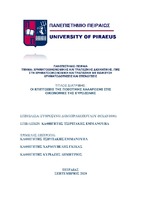| dc.contributor.advisor | Τσιριτάκης, Εμμανουήλ | |
| dc.contributor.author | Δημητρακοπούλου, Ευφροσύνη | |
| dc.date.accessioned | 2020-11-25T12:27:04Z | |
| dc.date.available | 2020-11-25T12:27:04Z | |
| dc.date.issued | 2020-09 | |
| dc.identifier.uri | https://dione.lib.unipi.gr/xmlui/handle/unipi/13065 | |
| dc.identifier.uri | http://dx.doi.org/10.26267/unipi_dione/488 | |
| dc.description.abstract | Αντικείμενο της παρούσας διπλωματικής διατριβής είναι η ποσοτική χαλάρωση και πώς αυτή επιδρά στην πραγματική οικονομία στα πλαίσια της Ευρωζώνης.
Αρχικά γίνεται αναφορά στην έννοια της ποσοτικής χαλάρωσης (Quantitative easing - QE) η οποία συνίσταται στην νομισματική πολιτική κατά την οποία μια Κεντρική Τράπεζα παράγει χρήματα με την αγορά χρεογράφων, όπως είναι τα κρατικά ομόλογα. Σκοπός του συγκεκριμένου προγράμματος είναι η αύξηση της κατανάλωσης του ιδιωτικού τομέα αλλά και η ελεγχόμενη αύξηση του πληθωρισμού όταν δεν καθίσταται αποτελεσματικό το μέτρο της μείωσης των επιτοκίων (τη στιγμή που πλησιάζει το μηδέν) με σκοπό την ανάπτυξη της οικονομίας.
Κατ’ επέκταση αναλύεται η συμπεριφορά της Ευρωπαϊκής Κεντρικής Τράπεζας και πώς επιδρά η ποσοτική χαλάρωση στις χώρες της Ευρωζώνης αλλά και πώς επηρέασε η ανισότητα τη ζώνη του Ευρώ.
Τα αποτελέσματα της οικονομετρικής ανάλυσης αφορούν 18 χώρες την Ευρωζώνης και καλύπτουν την περίοδο από το 2000 έως και το 2019 και εξετάστηκαν 18 μακροοικονομικές μεταβλητές με σκοπό να φανεί τι επίδραση είχε η ροή χρήματος του προγράμματος στον χρηματοπιστωτικό κλάδο και κατά πόσο δημιούργησε συνθήκες ανάπτυξης την περίοδο της ύφεσης. | el |
| dc.format.extent | 88 | el |
| dc.language.iso | el | el |
| dc.publisher | Πανεπιστήμιο Πειραιώς | el |
| dc.rights | Attribution-NonCommercial-NoDerivatives 4.0 Διεθνές | * |
| dc.rights | Attribution-NonCommercial-NoDerivatives 4.0 Διεθνές | * |
| dc.rights.uri | http://creativecommons.org/licenses/by-nc-nd/4.0/ | * |
| dc.title | Οι επιπτώσεις της ποσοτικής χαλάρωσης στις οικονομίες της Ευρωζώνης | el |
| dc.type | Master Thesis | el |
| dc.contributor.department | Σχολή Χρηματοοικονομικής και Στατιστικής. Τμήμα Χρηματοοικονομικής και Τραπεζικής Διοικητικής | el |
| dc.description.abstractEN | The subject of this diploma thesis is quantitive easing and how affects the real economy within the Eurozone. First reference is made to the concept of Quantitive easing (QE), which is the monetary policy, where a central bank generates money by purchasing securities, such as government bonds.The purpose of this program is to increase the consumption of the private sector but also the controlled increase of inflation when the measure of reducing interest rates does not become effective (when it is also to zero) in order to develop the economy.
The behavior of European Central Bank and how quantitive easing affects the Eurozone countries, is analyzed as well how the inequality affected the Eurozone. The results of the econometric analysis concern 18 Eurozone countries and cover the period from 2000 to 2019 in order to examine 18 macroeconomics variables in order to see what effect the cash flow of the program had on the financial sector and whether or not it created growth conditions during the period of recession. | el |
| dc.contributor.master | Χρηματοοικονομική και Τραπεζική με κατεύθυνση στην Χρηματοοικονομική Ανάλυση για Στελέχη | el |
| dc.subject.keyword | Ποσοτική χαλάρωση | el |
| dc.subject.keyword | Ευρωζώνη | el |
| dc.date.defense | 2020-10-22 | |



